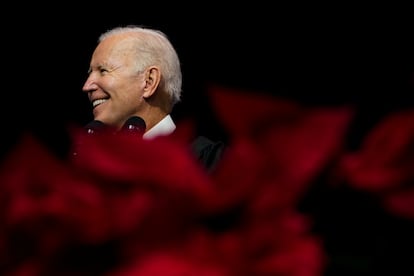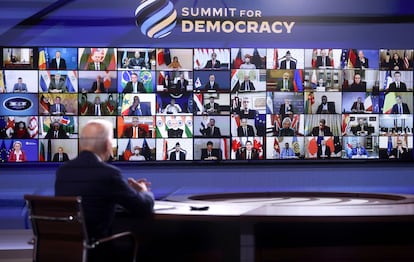Why the United States is no longer willing (or able) to be the world’s policeman
Joe Biden’s cautious handling of the Ukraine crisis and his rhetorical commitment to strengthening world democracy signal a new era in the country’s foreign policy


Coincidence dictated that the 80th anniversary of the attack on Pearl Harbor came in the same week that US President Joe Biden threatened Russian leader Vladimir Putin with “serious economic sanctions” if Russia decided to invade Ukraine, where the US has said it will not send troops, and at the same time that a rhetorical Summit for Democracy was held, which on December 9 brought 110 countries together at the table of fine words. The Japanese attack on the naval base at Pearl Harbor brought the US out of its isolationism, resulted in its entry into World War II and marked the beginning of a new era for Washington’s international relations. These recent gestures speak with eloquence about the new style of foreign policy adopted by the US president, characterized by caution and restraint. In the new world order, the United States is no longer willing (and is probably equally unable to) perform its self-appointed role as the world’s policeman.
Further evidence that things have changed was provided last summer when the US pulled out of Afghanistan, a decision that marked the first 11 months of the Biden presidency and was backed by internal polls and a majority of analysts in Washington. It was not, behind its chaotic façade, improvised: it followed the plan of an empire at a crossroads. “The bar for overseas intervention has been raised considerably,” says Charles A. Kupchan, professor of international affairs at Georgetown University, a senior fellow at the Washington think tank the Council on Foreign Relations and author of Isolationism: A History of America’s Efforts to Shield Itself from the World.
In Kupchan’s view, Afghanistan represented a “resetting of geopolitical priorities that, after two decades of focusing on the Middle East, will from now on be centered on Europe and Asia.”
“US supremacy is no longer taken for granted, as it was in the 20th century, and it has suited Russia and China that the US has been waging endless wars in places like Iraq, Syria and Libya. The Pearl Harbor era, which heralded the beginning of liberal internationalism and of consensus between Democrats and Republicans, is now history. Donald Trump’s ‘America First’ finished off that consensus,” says Kupchan.
Biden installed himself in the crumbling building of Trump’s foreign policy as the president with the most experience in the field since George H. W. Bush’s White House tenure from 1989 to 1993. That baggage, according to his aides, has instilled the president with confidence in his own instinct for international relations. Biden served as vice president under Barack Obama, when the US elected not to intervene in Syria despite saying it would if Bashar al-Assad deployed chemical weapons, which he did in 2013. And when Putin was warned of “serious economic sanctions” in March 2014, it did little to prevent the invasion and subsequent annexation of Crimea.
Biden’s priorities when he assumed office were summed up as “the three Cs”: climate, China and coronavirus. And with his talent for a slogan, he laid out a revolution that he defined as “Foreign Policy for the Middle Class,” which would pursue the ideal of a just global economy for workers, a demographic that has suffered enough images of children returning home from far-flung corners of the world in coffins wrapped in the American flag.

“Biden set out from a very difficult place. There has been a lot of rebuilding to do, not just externally, but also in purely bureaucratic terms. He found the organigram of the State Department [in which he installed Anthony Blinken, a seasoned cosmopolitan] in a seriously damaged state,” says Judah Grunstein, director of World Politics Review, who defines Biden’s foreign policy as “a combination of idealistic declarations [the Summit for Democracy and the diplomatic boycott of the Winter Olympics in China] and pragmatic actions,” such as the Aukus agreement, a trilateral security pact between the US, the United Kingdom and Australia designed to stem China’s influence in the Indo-Pacific region.
“In these first few months, the focus has been on restoring multilateral relations. Will this be enough to head off the crises that are on the table? I have my doubts; at the moment, a lack of concretion is marking his mandate,” Stephen Wertheim, a senior fellow at the Carnegie Endowment for International Peace and author of Tomorrow, the World: The Birth of U.S. Global Supremacy, tells El PAÍS.
The coronavirus pandemic has prevented Biden from traveling as much as he would have liked in a bid to restore the US’s image as a “team player,” according to Kupchan, who describes this era as “the age of mixed bipolarity,” as opposed to the unipolar order “that brought about the end of the Cold War.” With one important difference: “For the first time in its history, Washington is faced with a competitor on every level, China. The Soviet Union never attained that level. Its GDP never exceeded 55% of that of the US. This time it is different. We will soon find ourselves in a world in which China’s economy will be the largest. And we are already in a world in which two-thirds of countries do more business with China than they do with the US.” A growing number of Washington analysts also believe China has the military capacity to face off with the US over Taiwan.
Biden was also forced to hold the Summit for Democracy virtually due to the pandemic, an initiative that “doesn’t appear to have achieved a lot, either good or bad,” according to Wertheim. Kupchan found solace at least in the fact it was not staged with an attitude of “them against us.”
“Biden is obsessed, as he made clear during his campaign, with strengthening democracies, and that is to his credit, but presenting the issue as a struggle between democracies and autocracies is an error,” Kupchan adds. “We are facing a highly interconnected world in which power is more diffuse than ever. Without reaching the extremes of Trump, there is little other option than to cooperate with these regimes.”
For the first time in its history, Washington is faced with a competitor on every level, ChinaCharles A. Kupchan, professor of international affairs at Georgetown University
Anne-Marie Slaughter, a lawyer and CEO of the think-tank New America, went further in an article published in the opinion section of The New York Times in November. In her article, she advocated a “globalist” approach, which considers the world “as a place inhabited by eight billion people and not only divided into 195 countries. From a people-centric perspective, the most urgent goal must be to save the planet,” Slaughter argued, adding that squabbling with China will cease to seem important “when our cities are underwater.”
In the not-so-long term, all of the experts consulted agreed in their concern over rescuing the Iran nuclear deal (which Trump abandoned in 2018) and in Biden not going further than the imposition of sanctions over the Ukraine crisis, as well as strengthening NATO’s eastern flank and the shipment of military hardware from Afghanistan to the Russian border, as reported last week by The Wall Street Journal.
Taiwan is a different matter, they added, because the US and its allies are in agreement that China is a power that should be contained. Biden’s National Security Advisor Jake Sullivan recently reiterated the US’ commitment to defending the interests of Taiwan in a conversation with Richard Haas, president of the Council on Foreign Relations. Sullivan also reacted diplomatically to the latest list of demands from Russia, which among other things sought written assurance from NATO that it does not intend to expand toward its borders and the cessation of all military activity in Eastern Europe, Central Asia and the Caucasus that does not meet with Moscow’s approval. “It’s very difficult to see agreements getting consummated if we’re continuing to see an escalatory cycle,” Sullivan said.
The analysts consulted by EL PAÍS also share the opinion that Latin America is no longer a priority for the US government. A Mexican diplomat in Washington acknowledges that, at least, dialogue has improved over the past few months. Thomas A. Shannon, Under Secretary of State for Political Affairs under Obama, told EL PAÍS recently that “Biden needs time [in the region]. I don’t think he is progressing slowly in Latin America; I think he is progressing with caution and without haste.” It seems clear that there are other matters of urgency and they are not on that continent.
Tu suscripción se está usando en otro dispositivo
¿Quieres añadir otro usuario a tu suscripción?
Si continúas leyendo en este dispositivo, no se podrá leer en el otro.
FlechaTu suscripción se está usando en otro dispositivo y solo puedes acceder a EL PAÍS desde un dispositivo a la vez.
Si quieres compartir tu cuenta, cambia tu suscripción a la modalidad Premium, así podrás añadir otro usuario. Cada uno accederá con su propia cuenta de email, lo que os permitirá personalizar vuestra experiencia en EL PAÍS.
¿Tienes una suscripción de empresa? Accede aquí para contratar más cuentas.
En el caso de no saber quién está usando tu cuenta, te recomendamos cambiar tu contraseña aquí.
Si decides continuar compartiendo tu cuenta, este mensaje se mostrará en tu dispositivo y en el de la otra persona que está usando tu cuenta de forma indefinida, afectando a tu experiencia de lectura. Puedes consultar aquí los términos y condiciones de la suscripción digital.








































